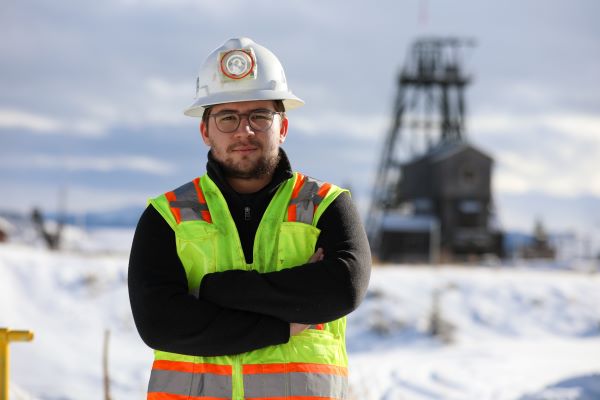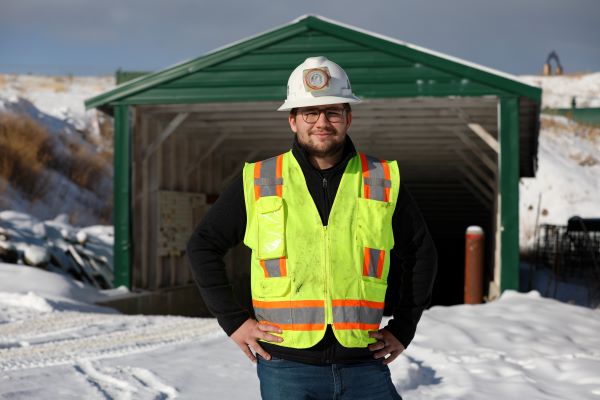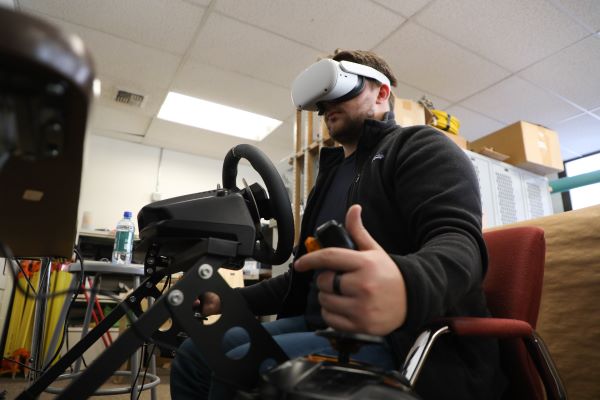Mining engineering student from Peru says hands-on learning opportunities, campus environment drew him to Montana Tech

When you ask Francisco Estatuet why he wants to be a mining engineer, his answer is simple.

“For me, mining is the basis for everything,” Estatuet said. “Everything we have, everything we own, everything we use on a daily basis is a product of mining. The fact that it is an industry that will never cease to exist is also reassuring. Plus, I think mining is really hands-on with fieldwork, too, and then you transition into an office job.”

Estatuet, from Lima, Peru is extremely well-traveled. His father is a mining engineer whose work took the family all over the world. His first language was Malay, because the family lived in Indonesia.
“Then I learned English, and then Spanish,” Estatuet said. “I've been to Australia, Hong Kong, Indonesia, Singapore, Spain, the Netherlands, but I haven’t been to Africa yet.”
When Estatuet decided to pursue mining engineering, he started with a list of universities around the world, with options in places like Russia and Germany. Because English is his strongest language, Estatuet thought a college in the U.S. might work the best. Estatuet’s father had a few recommendations of colleges with excellent mining engineering programs. Estatuet visited campuses, compared degree plans, and did an in-depth analysis of which school would help him best reach his career goals.
“The colleges included Penn State, South Dakota School of Mines, and Montana Tech,” Estatuet said. “Montana Tech stood out.”
The Underground Mine Education Center (UMEC) helped attract Estatuet. The UMEC, situated at the former Orphan Boy Mine west of campus, is an on-campus underground mining facility. With its comprehensive interdisciplinary approach, the UMEC serves as a hub for hands-on learning and research in mining engineering, geological engineering, environmental engineering, metallurgical engineering, and occupational safety and health.
“The UMEC is such a motivator to come here,” he said. “Students get to have hands-on experience that is not from internships. It's from just the university classes. That was just so valuable for me.”
The people at Montana Tech were also welcoming.
“The people here are just amazing, in general,” Estatuet said. “I had the best time ever because everybody was so friendly.”
Estatuet also wants to minor in geology, math, and mineral processing to be able to understand and work in all parts of the mining and mineral extraction supply chain. Montana Tech’s degree plan introduces geological principles early in the education process, which is something Estatuet believes is important for internship and career advancement.
“At Montana Tech, you take geology second semester,” he said. “Meanwhile, at one of these other colleges, you take it in the third year. So, you have to wait a long time, and you don't have much space to do internships because you don't have any mining or career related courses yet.”
As an international student, Estatuet has to carefully tailor his study plans because his visa only allows so many hours of internship and coursework. As a first-semester freshman he already has his bachelor’s degree planned out semester by semester, and is in the process of exploring whether he might want to pursue a master’s degree in mining engineering, or another related field, like metallurgical/ minerals processing engineering or geological engineering.
Overall, college is going well for Estatuet.
“My GPA is 3.94,” he said. “My grades here are much better than they were back in Peru. I think the change of atmosphere has helped. Everybody here is working for their future. You have the professors that are here to help you. They want you to do well and you just have to make most of everything you have at your disposal.”
Estatuet is already involved in research with Assistant Professor Christopher Roos. The project involves creating a virtual reality safety simulation where students can practice driving the heavy equipment used in the UMEC before having to do it in real life. Safety simulators can cost thousands of dollars, so Estatuet is working with Roos on a version that provides excellent training, at a fraction of the cost.
Estatuet also works an on-campus job in Career Services. He says time management is a huge part of why he’s able to do so many things.
“Right now, I'm really time efficient,” Estatuet said. “I plan out weeks ahead, or even years ahead. I have my next three semesters planned out already, especially what courses I'm going to take or what jobs I'm going to look for. For example, in terms of homework, I mostly do all the homework in the first two days of the week. Monday, Tuesday, I am already done for the whole week.”
While getting to Butte required an intimidating trip to an embassy to obtain a visa, an 18-hour flight, and adjusting to the cuisine, cold weather, and culture of Montana, Estatuet said it’s been worth it.
“It truly is an amazing experience to be studying outside of Peru,” Estatuet said. “The resources you have at Montana Tech are unlimited in terms of studying, books, tutoring. All of that just makes it such an incredible experience.”
His advice to other students is simple.
“Make friends, call your parents every week, and make the most of it,” he said.